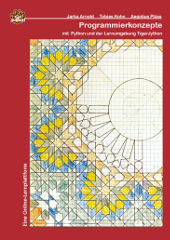Häufigkeitsanalyse von Wörtern in einem Text (Kleinprojekte)
Erstellen Sie ein Programm, dass eine Textdatei einliesst und die hundert häufigsten Wörter ausgibt.
0 Kommentare
4 Lösung(en)
from string import punctuation
def sort_items(x, y):
"""Sort by value first, and by key (reverted) second."""
return cmp(x[1], y[1]) or cmp(y[0], x[0])
N = 100
words = {}
filename = raw_input("File to analyze: ")
words_gen = (word.strip(punctuation).lower() for line in open(filename)
for word in line.split())
for word in words_gen:
words[word] = words.get(word, 0) + 1
top_words = sorted(words.iteritems(), cmp=sort_items, reverse=True)[:N]
for word, frequency in top_words:
print "%-10s:%5d" % (word, frequency)
/*-----------------------------------------------------*\
| um uns allen das gehassel mit dem file-einlesen hier |
| hier zu ersparen, wird der text über html geladen und |
| liegt als string $txt vor. |
\*-----------------------------------------------------*/
function wordFrequency(txt, nMostFrequent) {
nMostFrequent = nMostFrequent || 100;
// text vorbereiten und in array umformen
txt = txt.toUpperCase();
txt = txt.replace(/ß/g, 'ss');
txt = txt.replace(/[^A-Z ÄÖÜ]/g, '');
txt = txt.split(' ').sort();
// häufigkeiten ermitteln
let i = 0;
while (i < txt.length) {
txt[i] = [txt[i], 1];
while (txt[i][0] == txt[i+1]) {
txt[i][1]++;
txt.splice(i+1, 1);
}
i++;
}
// nach häufigkeit sortieren
txt = txt.sort(function(a, b) { return a[1] < b[1]});
return txt.slice(0, nMostFrequent);
}
// ausgabe
console.table( wordFrequency(txt) );
Lösung von: Lisa Salander (Heidi-Klum-Gymnasium Bottrop)
// NET Core 3.x
using System;
using System.IO;
using System.Linq;
using System.Text.RegularExpressions;
namespace CS_Aufgabe_Haeufigkeit_Woerter
{
class Program
{
static void Main(string[] args)
{
string path = @"C:\...\test.txt";
if (!File.Exists(path)) return;
new Regex(@"^[\s]*$").Replace(File.ReadAllText(path), "")
.ToLower()
.Split()
.Where(x => x.Length > 0)
.GroupBy(s => s)
.ToDictionary(g => g.Key, g => g.Count())
.OrderBy(x => -x.Value)
.Take(100)
.ToList()
.ForEach(x => Console.WriteLine(x));
}
}
}
Lösung von: Jens Kelm (@JKooP)
// C++ 14 | VS-2022
#include <iostream>
#include <fstream>
#include <string>
#include <sstream>
#include <vector>
#include <algorithm>
#include <map>
constexpr size_t MOST_FRQ{ 100 };
std::string get_file(const std::string& path) {
std::ifstream input(path);
if (!input) {
std::cerr << "Pfad nicht gefunden: " << path << "\n";
return "";
}
std::stringstream buffer;
buffer << input.rdbuf();
return buffer.str();
}
std::vector<std::string> get_split_string(const std::string& str) {
std::vector<std::string> out{};
std::string wrd{};
for (const auto& c : str) {
if (!std::isalnum(c)) {
if(wrd.length() > 1)
out.push_back(wrd);
wrd.clear();
}
else wrd.push_back(c);
}
out.push_back(wrd);
return out;
}
template<typename T>
std::map<T, int> get_map(const std::vector<T>& v) {
std::map<T, int> m;
for (const auto& i : v)
if (m.count(i)) m[i]++;
else m.emplace(i, 1);
return m;
}
template<typename T, typename V>
std::pair<V, T> get_swapped_pair(const std::pair<T, V>& p) {
return std::pair<V, T>(p.second, p.first);
}
template<typename T, typename V>
std::multimap<V, T> get_ordered_map(const std::map<T, V>& src) {
std::multimap<V, T> dst;
std::transform(src.begin(), src.end(), std::inserter(dst, dst.begin()), get_swapped_pair<T, V>);
return dst;
}
int main() {
const auto path{ "C:\\...\\pseudo.txt" };
auto file{ get_file(path) };
std::transform(file.begin(), file.end(), file.begin(), ::tolower);
const auto split{ get_split_string(file) };
const auto group{ get_map(split) };
const auto order{ get_ordered_map(group) };
auto i{ 0 };
for (auto it{ order.rbegin() }; it != order.rend() && i++ < MOST_FRQ; ++it)
std::cout << it->second << " -> " << it->first << "\n";
}
Lösung von: Jens Kelm (@JKooP)
Aktionen
Neue Lösung hinzufügen
Bewertung
Durchschnittliche Bewertung:
Meta
| Zeit: | 2-4 |
| Schwierigkeit: | k.A. |
| Webcode: | 8jq4-ci6b |
| Autor: | Martin Guggisberg (Universität Basel / PH FHNW) |




